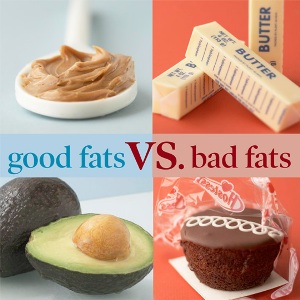 |
| Good vs. Bad Fats. |
How many of you, when buying groceries, turn the box over and look at the food label?
Great first step.
It's important to know what's in our food. But what's the first thing you look at? If your first glance is at the fat content, stop it!
Being afraid of fat is what's gotten us into trouble in the first place.
Though the years, Americans have developed this fear of fat. That all fat bad for us, and we should stay clear of it at all costs. That couldn't be further from the truth.
Fat does NOT immediately store in/on your body as fat! Fat is created on your body though stored energy, which is excess/extra calories!
You know those low-fat/no-fat diets that were pushed for years and years? Turns out they might have made Americans fatter than ever before.
The healthy fats (yes, there are healthy and necessary fats) have been cut out of our diets, and have been replaced with processed carbohydrates and refined sugars (that store in our bodies as fat after digestion). THAT is what has made obesity rates sky rocket. Along with rising rates of heart disease and Diabetes, low-fat diets have done a number on Americans' health.
Meanwhile, a fear of fat continues to be instilled in us. The fear of fat has got to stop. Fat in your diet is not the enemy, and it never has been our enemy.
Four Kinds of Fat
 |
| Trans Fat - What we should AVOID! |
Avoid
Trans fat (the one we should avoid!!): This shows up on food labels as hydrogenated and partially hydrogenated oil. These fats do NOT occur naturally, and are produced through a process where vegetable oil is heated up using hydrogen gas, making it more solid (called Hydrogenation).
This process was intended to increase shelf life and improve the texture of processed foods.
In a nutshell, trans fat wreaks havoc on our bodies. It has been shown that if only 3% of your daily calorie intake are trans fats, you raise your risk of heart disease by 23%!
Trans fat is most commonly used in commercially baked goods, crackers, salad dressings, and fried foods. And just because it says "Trans Fat Free" on the box, doesn't mean there isn't any trans fat in the product.
The FDA allows that label on anything that has less than a half-gram of trans fat per serving. Sure, a half-gram is nothing, but it adds up over time! So word to the wise: check the ingredient list. If you see hydrogenated or partially hydrogenated oil, put down the box and find something else to buy!
In Moderation
Up until recently, saturated fat (found in animal fats/protein) has gotten a bad rap. It was widely claimed that saturated fat raised your cholesterol, and was so bad for you, it would kill you. Studies now show that, while animal fats do in fact raise LDL (bad cholesterol) levels, they help raise your HDL (good cholesterol) as well.
 |
| Trans fats break down of fast food fries and chicken. |
'Healthy' Fats
Unsaturated fats (monounsaturated and polyunsaturated) are essential to a healthy diet, and an optimally functioning body. It has been shown that fatty acids help our cells stay move-able and flexible, and also help build cell membranes.
Fatty acids also benefit nerve function as fats compose the material that insulate and protect our nerves. Consuming healthy fats also slows the digestion process, allowing our bodies to absorb more nutrients.
Monounsaturated fats which are found in whole milk products, olive oil, sunflower and flax seed oils, red meat, nuts, and avocados, have great benefits. Fats are essential to brain function (the brain is composed of 60% fat!!), and aid in learning ability and memory retention. They've also been shown to reduce LDL cholesterol levels.
 |
| 'Healthy' fats. |
These fatty acids are also particularly important during pregnancy, as they are are critical to fetal brain development.
The fact that these fats are 'healthy' should always be kept in mind. However it's not permission to eat an entire package of almonds, or go crazy with guacamole every night.
After all, there are nine calories per gram of fat in food (versus four calories per gram in both protein and carbohydrates). The idea is to enjoy these things in moderation on a regular basis, within a balanced diet to aid body/brain function, lower cholesterol, and decrease the risk of heart disease.
The stigma of fat, that it makes you fat and it is bad, needs to change! What will make you fat is excess calories that will be converted and stored as fat. Again, fat does not go directly into your body, and become fat on your body. So stop being scared of fat! Stop worrying about the fat content of foods, and start paying attention to the quality (no trans fats and processed carbs), and quantity of your food!
Hope you found this helpful!

LINKS:
Jillian Michaels Podcast 4/8/2011


0 comments:
Post a Comment